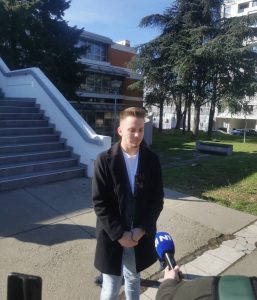Students involved in the “Studenti u blokadi” (Students in Blockade) movement revealed late last week that their social media profiles had been targeted by an unprecedented, large-scale operation involving a massive influx of fake followers. Their suspicion that the goal was to get their pages shut down by the platforms was confirmed. However, quick and effective action allowed them to foil the attempt and prevent damage.
The coordinated attack was first noticed on the main “Studenti u blokadi” Instagram page, with a rapid increase in followers, while parallel attacks were launched against the profiles of individual faculty groups.
“This clearly represents one of the pathetic attempts to control the population and prevent the spread of free thought that calls for rebellion against the rotten regime,” stated the “Poljoprivredni blokada” (Agriculture Students in Blockade) profile.
The social media platform TikTok quickly reacted to the artificial follower surge and deactivated some student accounts.
Balsa Bulatovic, a student at the Faculty of Technical Sciences (FTN), explained that two types of attacks were identified, both sharing the same goal of deactivating the student profiles. The first involved the sudden increase in fake, foreign followers. The second involved mass reports for inappropriate content, designed to trigger an automatic reaction from the platform’s AI, which locks the profile pending analysis.
The “IT Blokada” Association issued an immediate statement calling for urgent assistance, labeling the incident a coordinated campaign aimed at erasing key information channels.
The students from the FTN swiftly defended and unblocked their profile, stating: “If you thought that with your semi-literate staff and bots you could outsmart the alumni club of the largest faculty in this part of Europe… Thousands and thousands of engineers who work in the largest global companies, including Meta, have come out of our classrooms.” Other student groups have also regained control of their profiles.
Professor Djordje Krivokapic of the SHARE Foundation confirmed that the profiles were successfully restored through collective action. He categorized the incident not as hacking but as a manipulative attack involving the abuse of online mechanisms. He noted that such a coordinated attack, involving hundreds of thousands of new followers from “Eastern markets,” is unprecedented in scope and clearly requires significant resources and organization, pointing to a high motivation behind the perpetrator, though their identity is currently unverified.
Marketing expert Igor Avzner drew parallels between this operation and the attacks on independent media like N1, Nova, and Danas, suggesting the reason is the same: the public trusts them. He argued that every piece of information that challenges the government’s narrative endangers the manipulative nature of the current authority.
“The move [by the regime] to shut down, hack, or even take over profiles is a complete failure… and only brought them another lost battle,” Avzner concluded.
Source: N1




